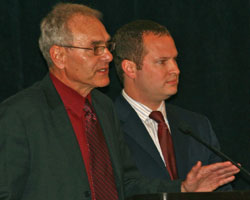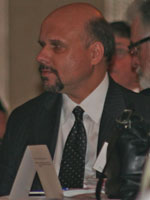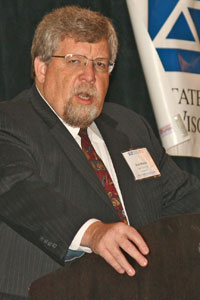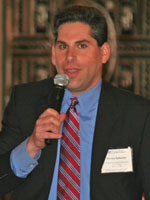By Alex De Grand, Legal Writer
May 6, 2009 – The State Bar will add its perspective to the litigation testing the constitutionality of Wisconsin’s judicial code that prohibits judges from joining political parties. At its May 6 meeting, the Board of Governors voted to submit an amicus brief to seek reversal of the federal district court decision in Seifert v. Alexander, 08-CV-126.

Former State Bar President Gerry Mowris (left) addresses the board on behalf of the Criminal Law Section in support of a petition to amend SCR Chapter 72 to clarify the authority of Wisconsin courts to manage their own files, including their expungement. Erik R. Guenther spoke in support of the petition for the Individual Rights and Responsibilities Section. The board will vote on this issue at a future meeting.
Milwaukee Judge John Siefert has challenged three provisions of the Wisconsin Code of Judicial Conduct as infringements of his First Amendment speech rights. Specifically, he contests SCR 60.06(2)(b)(1) prohibiting party membership of a judge or judicial candidate, SCR 60.06(2)(b)(4) forbiding a judge or judicial candidate from publicly endorsing a political party candidate or platform, and SCR 60.06(4) preventing a judge or judicial candidate from personally soliciting or accepting campaign contributions.
The State Bar will ask the U.S. Seventh Circuit Court of Appeals to consider the importance of judicial independence and, specifically, the effect of this decision on parties, practitioners, and litigants. Previously, the Board of Governors had expressed support for the judicial code while the case was pending before the federal district court and had urged the state Attorney General to appeal the district court ruling.
In other matters, the Board of Governors voted to:
- Oppose elimination from the state budget the positions of administrative law judges as they relate to probable cause determinations. In February, the governors had called for the preservation of probable cause hearings for many types of complaints made to state agencies, including allegations of discrimination in employment, housing, and public accommodations. The governors learned that those hearings were included in the current budget legislation, but that it failed to include the ALJs who would actually conduct the hearings.
- Return for further study proposed changes to the State Bar bylaws. Among the notable changes, the revisions aim to institute a runoff election when no candidate for president-elect, secretary, or treasurer fails to receive greater than 50 percent of the vote. A candidate for president-elect, secretary, or treasurer seeking self-nomination would also be required to provide a petition signed by 2 percent of the total active State Bar membership, changing the current requirement of 100 signatures. The deadline for submitting these necessary signatures would change to the date the State Bar announces the candidates it nominates. Presently, a self-nominating candidate can submit a petition after learning of the State Bar-nominated candidates.

Gov. Nick Zales, Milwaukee, listens to discussion during board meeting.
Gov. Frank Remington regretted that the proposed revisions were presented as a single package because changes such as a procedure for removing an officer who can no longer serve are necessary. However, Remington and other governors raised First Amendment concerns regarding a bylaw that constrains an officer’s speech on positions taken by the State Bar. Likewise, Gov. James Boll, who will become the next president-elect on July 1, warned that changes to the election procedures could give the wrong impression that the State Bar seeks to muzzle expression of its membership.

Finance Committee Vice Chair Dean Dietrich presents the proposed conflict of interest policy to the board.
- Approve the Finance Committee’s proposed conflict of interest policy. Under the policy, State Bar volunteers are to complete a questionnaire every fiscal year to identify those arrangements that may create a conflict of interest such as maintaining a position or material financial interest in an entity from which the State Bar secures goods or services. Upon discovering a potential conflict of interest, a volunteer will report it to the appropriate governing board or committee and honor its decision regarding his or her further participation.
- Deny a request for funds by Legal Action of Wisconsin, Legal Aid Society of Milwaukee, and Disability Rights Wisconsin. These three groups sought $195,000 to fund an attorney position with each organization for a year. The money would have been diverted from the State Bar’s Access to Justice Project Fund reserve. The Access to Justice program aims to create a commission that develops and encourages means of expanding access to the civil justice system for unrepresented low-income Wisconsin residents. During board discussions, Gov. James Brennan said that the Access to Justice project aims to create systemic reform which is more consistent with the role of the State Bar than direct spending on attorney positions at particular legal groups.

Nonresident Lawyers Division President Steve Schuster, Washington, D.C., speaks to an amendment to SCR 10.04 to permit nonresident members to serve as secretary, treasurer, or chair of the Board of Governors.
- Endorse an amendment to SCR 10.04 that would permit nonresident State Bar members to serve as secretary, treasurer, or chairperson of the Board of Governors.
- Elect Wausau attorney Byll Hess and Oshkosh attorney Jessica King to the ABA House of Delegates as representatives of the State Bar of Wisconsin. Hess is the former chairperson of the Board of Governors and King is the current Young Lawyers Division delegate from the State Bar.
Approved President-elect Doug Kammer’s appointments to the Nominating committee for the FY 10 board chair. Committee members include Kevin Palmersheim, Middleton, John Schomisch, Appleton, and Nicholas Zales, Milwaukee.
The minutes will be posted to WisBar after approval at the June 26 Board of Governors meeting.
